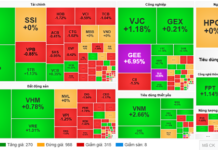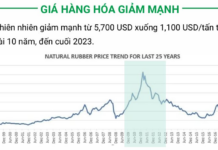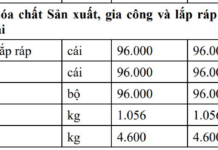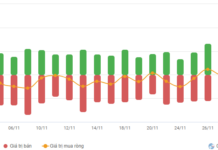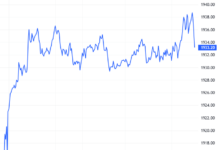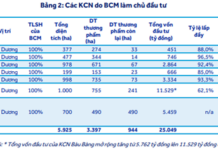From July 1st, 2024, the base salary will officially increase by 30%, from 1.8 million VND/month to 2.34 million VND/month, with retirement pensions also adjusted upwards by 15%. The minimum wage (monthly and hourly) has increased by 6% compared to 2023. As with previous salary increases, people are concerned about a potential rise in the price of goods, with some items increasing even before the salary adjustment.
INCREASED PRICES ARE HARD TO AVOID WITH HIGHER SALARIES
Even before the new salary mechanism was implemented, the prices of goods and services such as bread, haircuts, and eggs had already increased. According to a trader at a local market in Long Bien district, the prices of many vegetables and other items are also on the rise. However, the increase in vegetable prices is due to unpredictable weather conditions causing damage to the produce, while other items like sweet corn have become more expensive due to limited supply.
The increase in prices is not solely due to the salary adjustment but also to various other factors. Regarding the concern that higher salaries will lead to higher prices and inflation, Dr. Nguyen Duc Do, Vice Director of the Institute of Economics and Finance (Academy of Finance), pointed out that the salary adjustments primarily affect the public sector, which accounts for a relatively small proportion of the economy, employing less than 8% of the workforce, or about 4 million workers. Additionally, public sector salaries are significantly lower than those in the private sector.
According to Dr. Do’s calculations, the total wage bill for the entire economy will only increase by 2.4%. Therefore, the impact of the salary increase on inflation in the coming time will not be significant.
“Salary increases do impact prices, but not to a large extent. Prices are always fluctuating, and it is not feasible to prohibit price increases when salaries go up. The key question is the magnitude of the increase, as an inflation rate of around 4%/year is acceptable.
For example, the price of a men’s haircut may increase from 40,000 VND to 50,000 VND, but this doesn’t happen every year. It might occur once every five years or during special occasions like Tet, after which the price may decrease again. One person may notice a price increase in one market, but another market may not have experienced the same change. It could be that prices have increased in Hanoi but not in other provinces.”
Dr. Nguyen Duc Do, Vice Director, Institute of Economics and Finance (Academy of Finance)
Furthermore, with tens of thousands of commodities in the market, it is impossible for the government to control the price increase of each item in every location, nor should it attempt to do so. The government focuses on the CPI basket, which includes 11 groups of essential goods and services comprising 752 items, and controls variables that influence prices and inflation. These include maintaining a stable exchange rate, ensuring that money supply growth does not outpace the economy’s ability to absorb it, and keeping interest rates at an appropriate level.
“We need to base our assessments on statistical data rather than subjective feelings,” emphasized Dr. Do.
Sharing the same view, economic expert Dinh Trong Thinh stated that although the 30% increase in the base salary in the second half of the year is the highest ever, it should not lead to high inflation. In reality, the salary increase for civil servants and public employees is a small proportion and does not significantly affect the overall price level and the economy.
“The salary increase may have a psychological impact on people, which can cause a slight increase in the prices of goods, especially by small traders or in local markets. However, the government and its agencies are actively implementing various measures to ensure price stability in the coming time,” affirmed Mr. Thinh.
Commenting on the impact of this salary increase, Assoc. Prof. Dr. Nguyen Thuong Lang, from the Institute of Trade and International Economics (Vietnam National University of Economics), stated that the adjustment aims to continuously improve living standards to keep up with inflation and match the growth rate. It also helps maintain macroeconomic stability and affirms the government’s ability to regulate the labor market.
The 30% salary increase in the public sector in Vietnam, effective July 1, 2024, is a well-calculated decision based on thorough considerations, comprehensive assessments, and wide consultations with experts and the public. The salary increase will inevitably lead to some level of price increase.
AVOIDING PSYCHOLOGICAL INFLATION
To mitigate the impact of “price gouging” and psychological inflation due to the salary increase, Assoc. Prof. Dr. Dinh Trong Thinh suggested that the Department of Market Management (Ministry of Industry and Trade) and the Department of Price Management (Ministry of Finance) should strengthen their inspection and supervision of market prices and activities, especially for essential goods and services and those with prices determined by the government, after the base salary increase on July 1, 2024.
Additionally, it is crucial to maintain macroeconomic stability, control inflation, ensure major economic balances, and create a foundation for the sustainable recovery and development of the economy. The GDP growth rate in the first quarter of 2024 reached 5.66%, and the second quarter of 2024 is expected to grow by 6.93% compared to the same period last year, which is a relatively high growth rate in many years. Economic growth will be a supportive factor in maintaining economic stability, stabilizing psychology, and preventing psychological inflation.
It is also essential to enhance communication and propaganda regarding price management. Sharing the same view, Assoc. Prof. Dr. Nguyen Thuong Lang suggested that appropriate solutions are necessary to stabilize prices after the salary increase to prevent the establishment of a new price level, which could reduce real wages and partly undermine the effectiveness of the salary increase policy.
The government should build reserves of essential goods (such as food, medicine, and energy) on a large scale, ensuring a stable and sustainable supply chain. According to Mr. Lang, when the public sector increases salaries, businesses should actively support the government’s policy through initiatives or cost-saving solutions to reduce selling prices, enhance price competitiveness, and improve quality.
In addition to the pressure on prices due to the salary increase in the second half of 2024, the competent authorities will adjust the prices of some goods managed by the state according to the predetermined roadmap (such as possible electricity price increases twice, at the end of July 2024 and the end of 2024, and increases in university tuition fees and medical service prices). These adjustments will also have an impact on Vietnam’s CPI…
This article was published in the Vietnamese Economic Magazine, Issue 28-2024, released on July 08, 2024. Please visit the following link for the full issue :https://postenp.phaha.vn/chi-tiet-toa-soan/tap-chi-kinh-te-viet-nam.

4 Factors Putting Pressure on USD/VND Exchange Rate in Q1/2024
With the currency exchange rate fluctuating in the first few weeks of 2024, Mr. Ngo Dang Khoa, Director of Foreign Exchange, Capital Markets and Securities Services at HSBC Vietnam, highlights four factors putting pressure on the USD/VND exchange rate in Q1/2024…
Fighting Cross-Ownership: Impossible to “Take Tangibles to Treat Intangibles”
The recent amendment to the Credit Institutions Act, passed by the National Assembly during an extraordinary session, has introduced several measures to address cross-ownership, manipulation, and domination of credit institutions. However, it is challenging to “make the intangible tangible”! To prevent cross-ownership, it is crucial to enhance the effectiveness of inspections and supervision.

